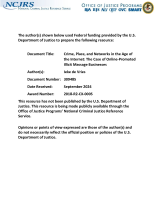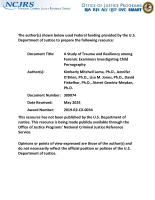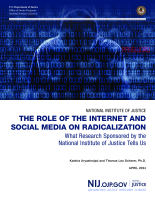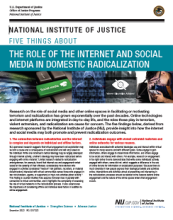Internet
Exposure to Child Sexual Abuse Material among Law Enforcement Investigators: Exploring Trauma and Resilience Profiles
Crime, Place, and Networks in the Age of the Internet: The Case of Online-Promoted Illicit Massage Businesses
A Study of Trauma and Resiliency among Forensic Examiners Investigating Child Pornography
The Role of the Internet and Social Media on Radicalization: What Research Sponsored by the National Institute of Justice Tells Us
Five Things About the Role of the Internet and Social Media in Domestic Radicalization
Incorporating accountability into internet email
A Training Tool for Internet Crimes Against Children Cases
Social Media and Domestic Radicalization
Social media has become a potent tool for spreading extremist beliefs and promoting violent extremism. NIJ Social Science analyst Aisha Javed Qureshi joins writer-editor Paul Haskins for a conversation about how scientific research is helping law enforcement and other agencies understand and address this growing concern.
Loners, Colleagues, or Peers? Assessing the Social Organization of Radicalization
Legislation Specifically Targeting the Use of the Internet to Recruit Terrorists
Taking Stock: An Overview of NIJ's Reentry Research Portfolio and Assessing the Impact of the Pandemic on Reentry Research
Over several decades, the National Institute of Justice (NIJ) has made significant contributions to the field of reentry, specifically what works for whom and when. In recent years, however, the global pandemic has made it increasingly difficult to conduct research on and with populations involved with the justice system. During this time, many researchers assessing various justice-related outcomes were unable to continue their inquiries as planned due to a lack of access to their populations of interest, forcing many to pivot and rethink their research designs.
See the YouTube Terms of Service and Google Privacy Policy







